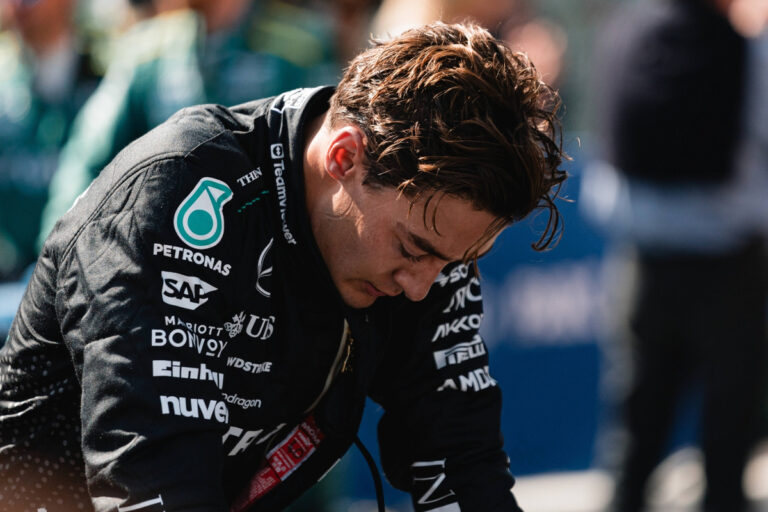F1 star George Russell regrets over…read more
Mercedes Formula 1 driver George Russell has voiced his frustration and regret over the strategic missteps made by his team during the recent British Grand Prix. The 27-year-old Briton, who was competing in front of his home fans at Silverstone, endured a weekend to forget as he finished in 10th place — his second-worst result of the 2025 season.
The timing of this disappointing performance could not have been more unfortunate. Russell’s future with the Mercedes team remains uncertain, with growing speculation about the team’s interest in four-time world champion Max Verstappen. Mercedes team principal Toto Wolff has openly acknowledged the team’s desire to bring Verstappen onboard, especially amid whispers that the Dutchman may be considering a shock departure from Red Bull before his contract expires.
Russell’s current contract with Mercedes is set to expire at the end of the 2025 season, and no extension has yet been confirmed. His rookie teammate, Kimi Antonelli, is also without a contract for the 2026 season and beyond. With Mercedes eyeing potential changes to its driver lineup, the pressure is mounting on both drivers to deliver strong performances.
Speaking after the race, Russell admitted that several decisions taken by the team during the British GP had backfired. “Everything just went wrong at every single point, to be honest,” he told reporters, reflecting on a chaotic and frustrating afternoon.
The race was marked by the unpredictable British weather, which created a tricky scenario for teams and drivers alike. Intermittent rain and changing track conditions made it difficult for strategists to make the right tyre calls, and Mercedes found themselves on the losing side of the gamble.
Russell explained that the team’s initial decision to switch to slick tyres wasn’t entirely unreasonable. “At the beginning, pitting for slicks wasn’t a stupid call,” he said. “We knew it was going to be dry for about 25 minutes, but then we had around 15 minutes of virtual safety car. That really hurt us because we couldn’t get enough temperature into the tyres, and we didn’t have the chance to benefit from the dry conditions.”
By the time the stint ended, Russell noted that they were lapping significantly faster than drivers who had stayed on wet-weather tyres. However, the opportunity to make gains had already slipped away due to the extended safety car period that neutralized the track.
Later in the race, Russell took some responsibility for the final pit stop decision, admitting that he may have called to box a lap or two earlier than optimal. However, he was taken aback by the team’s choice to fit hard compound tyres for the final stint, which ultimately didn’t work out. “I wasn’t expecting the hard tyre,” he said, “and from there, everything just fell apart. It was a really disappointing day.”
Despite his disappointment, Russell acknowledged that the team had opted for a bold strategy rather than a conservative one. “If you play it safe, you’ll come home with a safe result — but that’s not what we were going for,” he said. Mercedes had clearly hoped to capitalize on the volatile weather and gain an edge over their rivals, but the strategy failed to pay off.
As contract negotiations loom and the team continues to evaluate its driver options for the future, performances like Silverstone may weigh heavily in the final decision. For Russell, a driver who has shown flashes of brilliance but struggled with consistency this season, the British Grand Prix serves as a harsh reminder of how quickly fortunes can change in Formula 1 — and how critical each race is when your future hangs in the balance.




